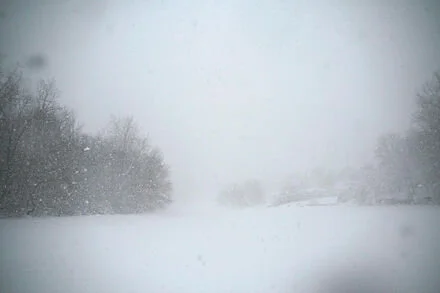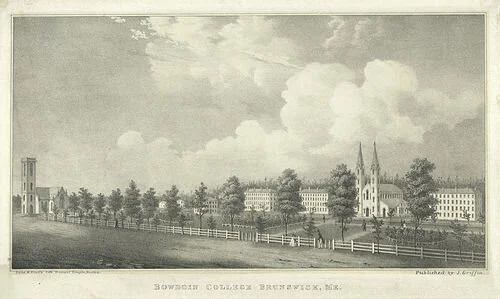When feeble suns scarce light the wintry sky,
And clouds are drifting in the doubtful air,
The pensive man, with expectation high,
Forth to the window moves his easy chair.
Observant there, in pleased security,
Regaling, as he may, both eye and ear,
He marks the frozen brook, the withered tree,
And loves, at frequent intervals, to hear
The howling of the blast, that winds its summons drear.
II.
The pensive man, to thought and feeling prone,
Inclined to sadness, but averse from sorrow,
In silence sits, and loves to be alone,
And joy from inward contemplations borrow.
Thus let me muse, nor do thou deem it strange,
That it is given the sense of joy to find
From varying thoughts that unrestricted range,
Light and unfixed, as is the stayless wind,
Pleased with the present scene, and to the future blind.
III.
'Tis Winter, in its wild and angry mood!
And as I look, behold, the clamorous crows,
Scared by the uproar vast, in yonder wood,
Regain a shelter from the blast and snows,
Where pines and firs their thick protection yield.
There nestle they retired, nor heed the cry
From muffled owl, in hollow trunk concealed.
Hid in the twisted roots, with fearful eye,
The wary fox beholds the tempest hurrying by.
IV.
Forth from the wood the wood-cutter comes back;
Upon his frosty beard the snow stands thick;
He looks with peering eye to find the track,
Then struggles on with panting breath and quick,
Seeking his home. Anon, a traveler's sleigh
Goes swift, with bells, that chime their stifled din.
But he, who rides on such a stormy day,
With aid of whip and voice, shall scarcely win,
Seen dimly in the drifts, the distant village Inn.
V.
A refuge seeking from the surly winter,
The red-breast comes, unto the window flying;
Well pleased, I haste to let the stranger enter,
And strive to keep the little thing from dying.
See, how he hops abroad and picks the bread,
The hospitable hand of childhood brings;
Then pausing, as in thought, erects his head,
And glances quick, and trims his little wings,
And with a sudden voice breaks gladly forth and sings.
VI.
Unmindful of the storm, the noisy cur
Shakes his well powdered sides, and barks, and now,
A sharer in the elemental stir,
With plunging head into the drift doth plough,
And upward throws around the 'feathery snow.'
But Dobbin! such an hour's no sport for him.
With ruminating head, depending low,
And half-shut eye, with gathered snow-flakes dim,
Close to the sheltering barn, he draws his quivering limb.
VII.
The weary thresher lays aside his flail,
And shuts, like one amazed, his granary door;
Nor else can do: the winds his heaps assail,
And wheat and chaff fly wildly round the floor.
The shades still darker wrap the rolling cloud,
And hurtling snows come rushing still more fast;
Low to the earth the groaning trees are bowed,
From rock and hill in headlong ruin cast.
The village steeple waves and trembles in the blast.
VIII.
At such an hour let none adventurous roam.
Dear to the heart, at such a time as this,
Is the security and peace of home,
The blazing hearth and the domestic bliss.
See, how the traveler scarce resists the storm!
Mark, how he strives along with fainting feet!
And doomed, without the friendly welcome warm,
To perish in its freezing winding-sheet!
Then heap the favoring blaze, his weary steps to greet!
IX.
Yes, turn and rest thee, tir'd and suffering one!
Haste, at the blazing hearth-stone take thy stand!
Fear not, that any here thy woes will shun,
And hold from sorrow's aid the helping hand.
It is for this the stormy tempests blow,
To show how small the boasted strength of man,
And when a suffering brother comes in woe,
That 'tis a part of heaven's benignant plan,
To ope the friendly door, and help him as we can.
X.
The sun sets now; and yet no sun doth rest
Upon the mount its golden orb of light.
Dark clouds usurp his place; and shades unblest
And moaning sounds the startled air affright.
In yon lone cot the mother trims the blaze
That through the window sends its nightly beam.
Unmoved by fears, that older hearts amaze,
Though fierce the snows invade each gaping seam,
The children, gathering round, enclose its cheerful gleam.
XI.
The winds are rude, but they regard it not,
And laugh, as they were wont, and prattle loud;
Prone on the floor, unconscious he of aught,
The shaggy dog with closing eye is bowed.
The cat doth in its corner sit demure;
And as the crackling fire lights up the room,
The housewife spreads the table of the poor,
Or plies with careful hand the busy broom,
Or doth her task once more, her wonted wheel resume.
XII.
Snug in the corner doth her good man sit,
Nor ever from his lazy settle moves;
The howling blast frights not his quiet wit,
But stormy sounds and piping winds he loves.
He, philosophic, chides at needless sorrow,
Nor will he add to real, fancied ills.
But looks in storms to-day for calms to-morrow.
Thus fearful thoughts and low complaints he stills,
And ever and anon, his patient pipe he fills.
XIII.
Happy the man, in winter's stormy hour,
When woods and plains with angry snows are strown,
Who is not doomed to feel their hostile power,
But hath a shelter he can call his own,
The cheerful hearth, the amicable chair.
He, with his gossip neighbors side by side,
Spreads cheerfully the peasant's homely fare.
They deal the mutual jest. Then venturing wide,
With patriot zeal elate, the nation's fate decide.
XIV.
How keen the glances of their generous strife!
Emphatic on the table strikes the hand!
Each holding firm, as if 'twere death or life,
The favorite text, that sinks or saves the land;--
Lesson sublime for patriotic ear.
Old Rover, stretched at ease upon the floor,
Erects his shaggy head the din to hear;--
Unusual now, though often heard before;
Meanwhile the outward storm still thunders at the door.
XV.
Ah me! On such a fearful time as this,
While we around the peaceful hearth are safe,
And in the warmth and glow of social bliss,
Forget the winds against the house that chafe,
And at the door and windows threat in vain,
The seamen on the overwhelming deep,
The tenants of the loud and doubtful main,
Can scarce their stations on the vessel keep;
See, how they mount on high, then plunging down they sweep.
XVI.
Anon, a wave, impatient of delay,
Bears suddenly some sailor from the deck.
Poor man! In the illimitable way,
That foaming spreads around, he seems a speck.
Now sunk, now seen, now borne on high, now low,
He smites the wave, like one that strikes for life;
But all in vain; far downward doth he go;
And as he yields at length the fearful strife,
He dying thinks once more of children, home, and wife.
“The Snow Storm,’’ by Thomas Cogswell Upham (1799-1872). Born in Deerfield, N.H., he became a major American philosopher, psychologist, poet and teacher. For many years, he was a professor of philosophy at Bowdoin College, in Brunswick, Maine.
Thomas Cogswell Upham
Bowdoin College, circa 1845. Upham taught there in 1825-1868.
— Lithograph by Fitz Hugh Lane
Deerfield, N.H., Congregational Church
Illustration of the Great Blizzard of 1888














